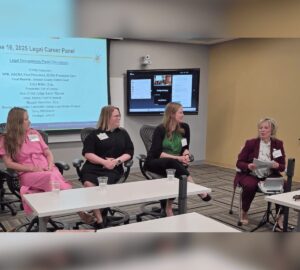Call it your personal horror story, call it Murphy’s Law; whatever it is, the best way out is always through. Members of the NCRA Technology Committee shared a few of their worst days. It may seem easy to gain perspective when it’s someone else’s problem, but you can adopt a few of their tactics to play it cool the next time you are facing your own horror story.
When you’re missing equipment
The job is easy when everything goes right. What do you do when it goes wrong? Or even worse, when you forget your computer?
This is not something anyone wants to admit happens, but it does. In my situation I drove 90 miles to provide CART services to a room full of d/Deaf and hard-of-hearing (HoH) individuals. It was not just a room of HoH individuals; it was a support group helping them cope with their newfound hearing loss.
I didn’t realize I forgot my computer until I got to the job site. When I got there, I was lucky enough to be able to borrow a computer. I was able to download my CAT software from the software website, download the drivers for my writer, and, since I keep my PCK code on hand (the key to access my software), I was able to type my PCK code into the software and grab my dictionary and layout files from the Cloud. I was up and running in less than 10 minutes.
You can be the greatest writer, but that doesn’t mean anything if you don’t have the needed equipment. Having a backup in many forms feels redundant until you need it. I was lucky as I had a great internet connection where I was located. But we aren’t always so fortunate. In addition to keeping everything in the Cloud, keeping a backup USB in your car with your software and necessary files can be a lifesaver if you are in a remote location and don’t have access to quality internet.
Merilee Johnson, RDR, CRR, CRC | Realtime Systems Administrator, Freelance CART captioner and court reporter, Eden Prairie, Minn.
Dealing with a micromanager
I was contacted by an agency to cover a huge realtime daily arbitration for them. It was two weeks long and the agency owner was concerned about it going well.
In short, he micromanaged me from the jump — including the first day of the arbitration. All day long. I had been reporting for 30 years at that point and had handled all sorts of realtime and daily copy trials, arbitrations, and depositions. It is exactly why he contacted me for his job.
The micromanaging was so intrusive and so flustering, on the second day I grabbed my son’s computer instead of mine. I was horrified when I unpacked my stuff to get started. I really had two choices — deal with it or give up. And I never give up.
I have my dictionary and all my include files in Dropbox. I have the writer drivers in Dropbox. I downloaded Eclipse and called them to get a temporary license. I installed the writer drivers. I downloaded StenoDirect from LiveLitigation and called them to get a license. I had 45 minutes to get this done. And I did. We did not start even one second late.
I remember the video/tech guy watching me slack-jawed — but I nailed it. As a follow-up, that agency owner and I have worked on dozens and dozens of jobs since then, and he never micromanaged me again! I have flown to Asia at the drop of a hat for him. Even though I am an official now, he contacts me if he needs something — and I have lots of friends that I refer him to.
Kelli Ann Willis, RPR, CRR | Realtime Systems Administrator Official Federal Stenographer, U.S. District Court, Northern District of Texas, Dallas, Texas
Accept it when you’re sick
I had accepted an assignment to caption a meeting several months in advance. When I was younger I did not have allergies, but over time I have become very sensitive to a variety of fragrances. For several months I had been coughing and running back and forth to see my doctor. I was starting to feel a little bit better.
However, as the days got closer to the meeting, I thought I was feeling well enough to go to work. I had been on medication for weeks, so when I arrived at the location, I still felt very druggy. I blew it off and proceeded to the conference room. I set up my equipment as usual. The chair to the committee started talking, and she spoke very fast. My mind could not keep up, not to mention my “steno” fingers.
When she stopped talking, I took a deep breath. My captioning was not my best. I was undecided on what to do because, obviously I was not myself, and I was unsure whether to stay the entire eight hours and it was only around 9 a.m. How in the world was I going to stay focused? I was so upset because the deaf attendees were depending on me.
I dug deep inside my survival bag (my purse). I had brought cough drops and water with me. After the break the meeting started again. I was fumbling and trying to suppress the cough that was starting to emerge. It was time to take another break. One of the members who happened to be the secretary to the committee leaned over and asked “Are you all right?”
I replied, “I’ve been sick, but I thought I was getting well.” She kindly said, “It’s okay. I’ll help you. I’ll take notes, too.” By the end of the day, I was starting to feel a little bit better, and my concentration had begun to improve. The attendees, as they were leaving, told me I did great. As nice as that statement made me feel, I still felt pretty uncomfortable about my realtime. They were so kind and appreciative. My tip: If you are sick, you should probably stay home and take care of yourself.
Teresa Russ, CRI | CART captioner and freelance court reporter Bellflower, Calif.
To read more horror stories, and to view the full text of this article, NCRA members can use their membership credentials to log into the April 2023 issue of the online JCR Magazine.
Special thanks to the NCRA Technology Committee for fearlessly sharing their worst moments. You are so brave!








